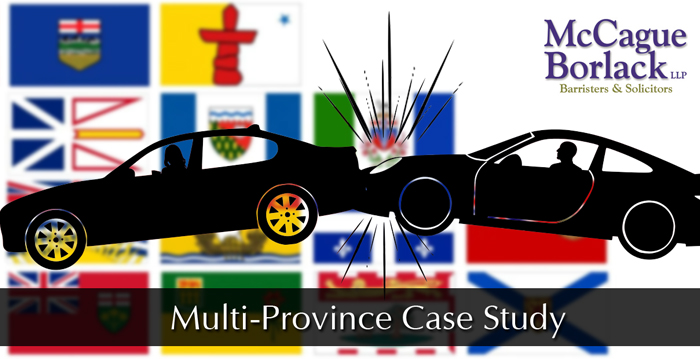In the case of Unifund Assurance Co. v. Insurance Corp. of British Columbia, a family insured under an Ontario motor vehicle policy, issued by Unifund, was driving a rental car in British Columbia when they were struck by a tractor-trailer insured by ICBC under a British Columbia insurance policy. The insureds sued in British Columbia and were awarded $2.5 million. Unifund, in turn, brought suit against ICBC with reference to section 275 of Ontario’s Insurance Act and sought to recover the benefits it had paid out to the family under the SABS.
The case went to the Supreme Court of Canada which found that Unifund could not rely on provisions of the Insurance Act to recover the benefits it had paid. In so doing, the Court explained that, based on the facts of this case, if an Ontario Act purported to regulate civil rights in British Columbia arising out of an accident in that province, it would be an “impermissible extraterritorial application of provincial legislation.” The Court further explained that “this territorial restriction is fundamental to our system of federalism in which each province is obliged to respect the sovereignty of the other provinces within their respective legislative spheres, and expects the same respect in return.”
The Court of Appeal revisited this seminal case in 2020, in Travelers v. CAA (“Travelers”), after an Arbitrator attempted to distinguish its facts from the Unifund decision.
...it would be an impermissible extraterritorial application of provincial legislation. |
Factual Background
In Travelers, the Claimant was catastrophically injured in an accident in Nunavut while driving a Nunavut-plated vehicle and covered under a Nunavut motor vehicle insurance policy issued by Travelers Insurance Company of Canada. Under that policy, the Claimant was entitled to Nunavut accident benefits.
At the same time, the Claimant owned a vehicle in Ontario, where she was ordinarily resident, and was insured by CAA Insurance Company (“CAA”) under the terms of the Ontario Standard Automobile Policy, and which included coverage for prescribed statutory accident benefits. The Court noted that Ontario’s SABS are more generous than those of Nunavut – for example, in Ontario, an insured can receive up to $400.00 per week in Income Replacement Benefits for the first 104 weeks following an accident, whereas in Nunavut, the corresponding benefit is up to $300.00 per week.
Under the terms of her Ontario insurance policy, the Claimant was contractually entitled to claim Ontario accident benefits from CAA, wherever she drove in North America. On this basis, the Claimant received benefits from CAA even though the accident occurred in Nunavut and did not involve her Ontario-insured car.
CAA pursued Travelers for reimbursement of the benefits under Ontario’s legislated motor vehicle insurance regime as a form of a “statutory cause of action”. CAA cited Justice Binnie at paragraph 10 of Unifund, where he stated that Unifund’s only cause of action was a statutory cause of action against the British Columbia insurer under the Ontario Insurance Act, rather than a common law or equitable cause of action.
In the arbitration, CAA succeeded in its claim and Travelers was required to reimburse CAA for benefits it had paid and assume responsibility for future benefits.
In reaching this decision, the Arbitrator relied on two factors to tie Travelers to Ontario’s statutory regime and in effect, distinguish its facts from Unifund:
- Travelers was signatory to the Power of Attorney and Undertaking (the “PAU”); and
- Travelers’ status as an “Ontario Insurer” – which the Arbitrator accepted based on Travelers’ being licensed to undertake automobile insurance in Ontario.
Travelers appealed to the Ontario Court of Appeal.
The Appeal
... nothing in this decision would affect the Claimant’s entitlement to Ontario accident benefits. |
The Court first clarified that nothing in this decision would affect the Claimant’s entitlement to Ontario accident benefits. The question was solely who should pay for these benefits.
The issue turned on whether in respect of the Nunavut policy, Travelers was considered an “Ontario insurer” for the purpose of the priority provisions of the Ontario Insurance Act.
The Court found that the Arbitrator made two critical legal errors.
The first error was with respect to the PAU. The Court clarified that being signatory to the PAU does not extend loss transfer and priority obligations among insurers otherwise liable to compensate an insured per Ontario’s Insurance Act. The purpose of the PAU is to protect insureds, not insurers. For example, if the Claimant had driven the Nunavut vehicle into Ontario and had the accident here, Travelers would have had to provide her with statutory accident benefits at the Ontario level under the Nunavut policy, but the purpose of the PAU is not to help insurance companies seek to recover their losses from other insurance companies in their home jurisdictions.
The second error was that the Arbitrator had relied on a single line in Unifund to consider Travelers to be an “Ontario insurer”. At para 12 in Unifund Justice Binnie stated: “There is no doubt that if the appellant were an Ontario insurer, it would be required to arbitrate Unifund's claim.”
However, Justice Binnie did not explain what he meant by an “Ontario insurer”. The Court explained that simply because Travelers was licensed to write automobile insurance in Ontario and had an office in Ontario, did not constitute Travelers as an Ontario insurer for all purposes. The Court stated at para 25: “Treating mere Ontario licensing as the sole reason to constitute an insurer as an “Ontario insurer” would give Ontario insurance legislation extraterritorial effect, which would be contrary to the essential holding in Unifund.”
The Court then explained that there were several reasons to conclude the Ontario Insurance Act had no application to Nunavut.
Firstly, based on the interpretation of the legislation, priority rules stipulated by s. 268 only apply if both insurers are subject to those rules.
...an insurance policy cannot both be governed by Ontario and Nunavut law at the same time. |
The Court engaged in an analysis by applying s. 268(1), s. 224(1)(a) and (b) to limit the application of the legislation to situations where the vehicle that is registered and insured extra-provincially is actually operated in Ontario. The Court also cited that s. 226(2) limits the application of the Insurance Act in providing that Part VI “does not apply to a contract providing insurance in respect of an automobile not required to be registered under the Highway Traffic Act”.
The Nunavut Insurance Act contains similar provisions: ss. 1(1), 2(2), 2(3), 39, 40, 124(1), 124(3).
Therefore, an insurance policy cannot both be governed by Ontario and Nunavut law at the same time.
Further, the Court explained that if the Arbitrator had been correct in applying s. 268, he misapplied the section by failing to consider the Claimant’s entitlement to Nunavut benefits under Nunavut legislation.
In all jurisdictions except Ontario, where the alternative source of compensation is another automobile no-fault policy, the automobile insurer of the owner of the vehicle involved in the accident pays the no-fault benefits (Insurance Law in Canada, 2018, Craig Brown and Andrew Mercer).
This is made clear in most of the Insurance Acts; see Alberta, s. 591(1); New Brunswick, s. 260(1); Nova Scotia, s. 143(1); Northwest Territories, s. 161(1); Newfoundland, s. 34(3), and the Yukon, s. 159(3) by a provision which provides:
(3) The insurance mentioned in paragraph (a) of subsection (1) is first loss insurance, and any other automobile insurance of the same type available to the injured person or in respect of a deceased person is excess insurance only. Although the meaning of this provision is not entirely clear, the confusion has been resolved in practice by a rule in the Insurance Bureau of Canada Inter-Company Claims Agreement. The insurer of the vehicle involved in the accident pays.
In contrast, in Ontario, a claimant's first recourse is to his/her own insurer. See Ontario Insurance Act, s. 268(2).
Therefore, if the Arbitrator had considered Nunavut law, he would have found that the Claimant was only entitled to Nunavut statutory accident benefits.
The judge allowed the appeal and issued a declaration that Travelers was not liable under s. 268 of the Ontario Insurance Act to reimburse CAA for the benefits it had paid to the Claimant, and thus, the holding from Unifund still stands: Ontario insurance laws do not have extra-territorial effect.

